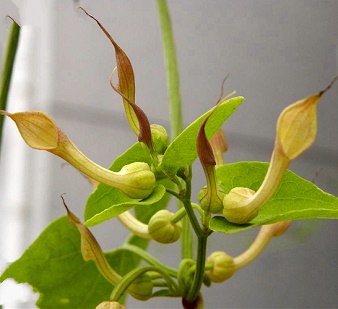Order: Piperales
General Overview: Aristolochia contorta, commonly known as the twisted dutchman's pipe, is a species of perennial climbing vine in the family Aristolochiaceae. It is native to China and is also found in parts of Japan and Korea.
Morphological Features: Aristolochia contorta is a climbing vine that can reach up to 10 meters in length. Its stems are woody, and the leaves are simple, alternate, and heart-shaped, with a length of up to 10 cm and a width of up to 12 cm. The plant has distinctive flowers that are shaped like a curved pipe, with a length of up to 8 cm and a width of up to 3 cm. The flowers have a reddish-brown exterior and a yellow-green interior, with a hairy texture. The flower blooms from late winter to early spring. The fruit of Aristolochia contorta is a cylindrical capsule, with a length of up to 7 cm and a diameter of up to 2 cm. The capsule contains numerous small, flat seeds. The roots of Aristolochia contorta are tuberous and fleshy, with a strong odor.
Biological Characteristics: The plant can be propagated by seeds or stem cuttings.Aristolochia contorta is used in traditional Chinese medicine for its anti-inflammatory and anti-cancer properties. The plant contains abundant bioactive compounds, including alkaloids (such as AAs, aristolactams, magnoflorine and allantoin), monoterpenes and sesquiterpenes (such as caryophyllene and aristolactone), β-sitosterol, pinitol, daucosterol, and other components. Howerver, aristolochic acid, a toxic compound that can cause kidney damage and cancer if ingested. As a result, its use in herbal medicine is controversial. In addition to its medicinal properties, Aristolochia contorta is also grown as an ornamental plant in gardens and parks for its unique and attractive flowers. It is a hardy plant that can tolerate a range of growing conditions and is relatively easy to care for.
Picture source

